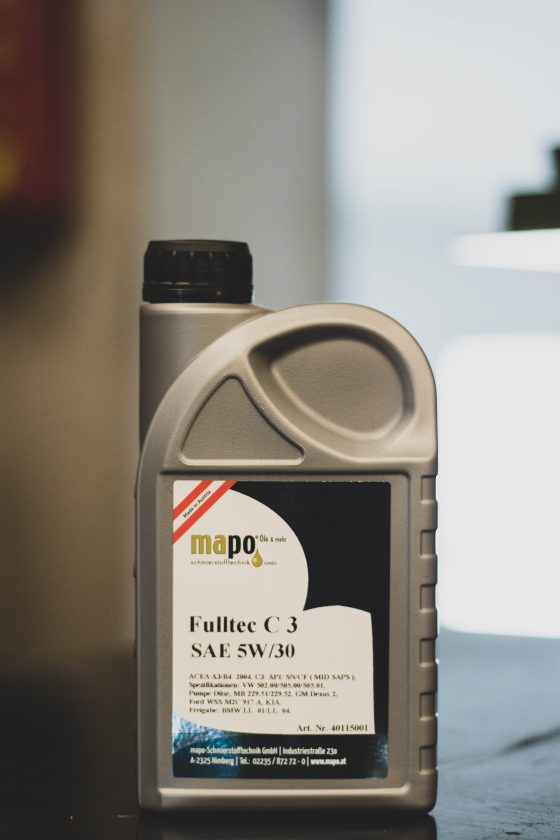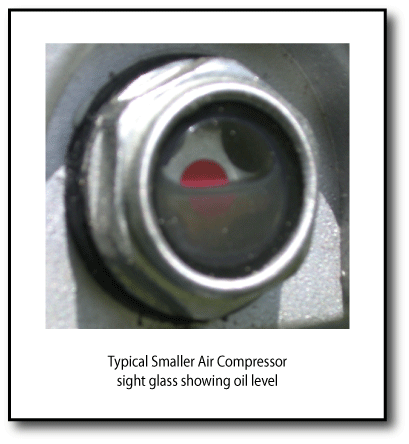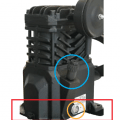Air compressor oils and lubricants are specifically developed and tested for respective compressor types and requirements. Their main tasks include reducing wear and tear, cooling of parts, sealing, and cleaning. But, what makes air compressor oils so different from regular oils?
This article will provide you with all you need to know about air compressor oils, including their types and alternatives!
Table of Contents
- What is Air Compressor Oil and What Does it Do?
- Air Compressor Oil Characteristics
- Types of Air Compressor Oil
- Air Compressor Oil Substitues & Alternatives
- Do All Air Compressors Require Oil?
- How Often Should I Change the Oil in my Compressor?
- What Determines Whether an Air Compressor Oil’s Life Span?
- How to Check Air Compressor Oil Level
- Where Can I Purchase Air Compressor Oil?
- FAQs (Frequently Asked Questions)

What is Air Compressor Oil and What Does it Do?
Air compressor oil is a unique lubricant used to prevent premature wear and tear in most air compressors. Air compressor oil is a critical component of maintaining a healthy compressed air installation. It is primarily a coolant, and so the oil removes any heat generated during the compression process.
A good quality air compressor oil reduces the wear and tear on rotating parts by using various additives that prevent metal from rubbing against metal. The oil cools the air compressor system so that the element does not overheat.
The oil also lubricates the rotors whilst sealing the compression chamber. Due to the fact that compressor oil is used for cooling and sealing, its required to be special and high-quality that is difficult to substitute with alternatives like motor oil – but we’ll dig into potential alternatives later.
Air compressor oil works by flowing around and between the screw elements, sealing the space in which air is being compressed in due course. Another important task is cleaning. Where dust may enter into the machine through the air filter, oil lubricants counter this and pick up the particles and essentially flush them from the system.
A true testament to their importance; if your air compressor oil fails, or does not lubricate as it should, the internal compressor components can quickly fail and become destroyed. Air compressor oil is typically either mineral or synthetic based, and differs from motor oil in that it has less sulfur and carbon, and most crucially, does not contain any detergent.
Air Compressor Oil Benefits
In addition to the air compressor oils obvious lubricant benefits, they also boast other significant benefits that make them essential for use with air compressors. These include:
- Anti-foaming capabilities – When big air bubbles rise to an oil’s surface, foam is naturally produced, which in turn, increases oxidation as the oil’s surface is exposed to oxygen. Therefore, without anti-foaming additives in oils, the oil separators would be saturated by the forming foam creating pressure drop, subsiquently reducing the compressors lifespan due to more energy consumption.
- Demulsification – Air compressor oil contains additives which are designed to protect the compressor from water and oil emulsions by improving water separation. This also makes it easier for the oleophilic bags to capture the oil later on.
- Heat absorption – Air Compressor oils absorb the heat produced from compressed air, thereby keeping the compressor at a cooler temperature.
- Longer lifespan – The additives which are in air compressor oil increase the lubricants lifetime while protecting machine components. This makes the lubricant compatible with a wide array of conditions.
- Oxidation resitance – The additives delay the oxidation process and acid formation at the surface.
- Viscosity in cold temperatures – Some oils will fail to effeciently do their job when in colder temperatures. Air compressor oils maintain their viscosity’s in a great range of temperatures from cold to hot. s
Air Compressor Oil Characteristics
When seeking an air compressor oil for your air compressor, your compressors manufacturer will provide basic guidelines so that you know which oil works best for optimum performance.
These guidelines, whether they’re in the manual or are given to you directly by the manufacturer, include three basic characteristics that you must fully understand so you know how they impact your system. These are:
- Additives
- Temperature range
- Viscosity
Now let’s look at these in more detail!
Additives
All oils contain additives which you must pay special attention to, so you’re aware of which ones are present in the oil you intend to purchase. Some additives will be very beneficial, while some can be potentially harmful to your compressor type.
For example, detergents in diesel oil can help clean diesel engines, but over time, can also ruin your motor and therefore reduce its lifespan. The type of additives you should look for are those that prevent corrosion and rusting of the motor. These types are extremely useful and are often found in most oils.
Temperature Range
Another important characteristic of the air compressor oil is its temperature range. Oils that have high viscosity, will function rather unpredictably if and when exposed to different temperature ranges (winter compared to summer). Therefore, your oil may react differently with temperatures that rise above 120°F or drop below the freezing point.
Typically, your air compressor will specify its suitable compressor oil temperature range. But, it’s important to be aware that if you live in an area with extreme temperatures, then you must ensure the viscosity and temperature are suitable for said environment.
Air compressors produce heat during operation, this must also be considered when purchasing compressor oil. The oil needs to withstand the temperature range so that it can work efficiently.
Viscosity
So now, let’s discuss viscosity. Viscosity refers to the texture, or more so, the consistency of the compressor’s oil. It’s common for manufacturers to recommend SAE20 or SAE30 compressor oil. They work on the same basis as motor oil, for a cold environment then SAE20 is recommended, and for a warmer environment, SAE30 is recommended because it is more viscous, meaning it will coat and protect better.
Viscosity is a very important characteristic to consider. If you purchase oil too thick or too thin, it will not only delay your work but also has the potential to damage the air compressor.
Types of Air Compressor Oil
When it comes to the types of air compressor oil, each having its own distinctive characteristics. The two types are:
- Mineral Oil
- Synthetic Oil
Both mineral and synthetic oils are suitable for air compressors. To choose between the two, you must take into consideration the type and amount of work you intend to carry out with your compressor.
Mineral Oil
Also known as standard air compressor oil, this is made using a mineral oil base. The oil is typically cheaper than synthetic oil and is more so recommended for DIYers or homeowners who don’t use their compressors continuously or that often. It is best suited to light or medium-duty work.
Mineral oil is volatile and far more likely to evaporate than synthetic oil. As a result of this, it is used up a lot faster. It also has a higher oil carry-over, so it can get into the compressed air network despite downstream components like oil filters and oil separators being prevalent.
Mineral oils are significantly more reactive than synthetic oils, due to their carbon chains which are not 100% saturated with hydrogen, meaning the oils react faster with other substances and cause sludge. This shortens the life span of the oil, the filters, and the separators.
Advantages
- Ideal for low to medium-duty work
- Lower costs than synthetic
Disadvantages
- Includes compounds of oxygen, nitrogen and sulfur which enables acid development, oxidation and contributes to sludge
- Low energy efficiency
- Molecular irregularities may create incosistencies in surface lubrication and thus, increase friction between parts
- Not fire-resistant
- Tend to overheat, requiring frequent oil changes
Synthetic Oil
Synthetic air compressor oil is made, as you may have guessed already, with a synthetic base. These oils undergo a lot of processing and therefore, are far more refined than standard mineral oils. Synthetic oils are great for professionals or homeowners who use their compressors frequently.
Synthetic oils allow the compressor to run more quietly and smoothly with a wider temperature range than mineral oils and, protect the compressor from overheating. Synthetic oils typically run 50% longer than standard mineral oils. They extend the life of your air compressor and are often consumed at a far slower rate, which in turn results in a less frequent need to top up the oil.
Synthetic oils do not contain sulfur or additives which helps prevent buildup around valves. They stay cooler than mineral oils and can help reduce various deposits which may affect the performance of the compressor.
Advantages
- High energy efficiency and usage per hour due to outstanding oxidative and thermal stability
- Low flammability
- Operate at lower temperatures, which leads to fewer oil changes
- Predicatbly effective under varying temperature ranges or environmental conditions
- Strong molecular bonds ensure consistent and reliable lubrication results
- Will not emulsify or create undesirable byproducts in humid conditions
Disadvantages
- Higher costs
- Incompatible with some elastomers, plastics, adhesives and coatings if used when not recommended
Synthetic oils are often recommended by manufacturers for reciprocating, rotary screw and rotary vane types of compressors for a number of reasons.
The main benefits of synthetic oils for reciprocating compressors include:
- Extended lifetime – they help prevent packings and piston rings from premature wear
- Less accumalation of carbon – they reduce the amount of accumalated carbon on valve and significantly reduce feed rates
- Safer operation – the auto-ignition temperatures and flashpoints are also higher for them
The main benefits of synthetic oils for rotary screw compressors include:
- Cooler temperatures – they stay cooler during compressor operation and produce an air discharge of a lower temperature
- Fewer deposits – they reduce the deposts such as varnish or sludge that lead to premature wear
- Less oil consumption – slower consumption rate
- Longer lifespan – they can extend rotary screw compressor life spans by up to 8000 hours
For information on what oil you should use in your compressor, visit our guide here! For more information on air compressor oil types and specific brand oil pages, visit this article!
Air Compressor Oil Substitues & Alternatives
Sometimes, it may be difficult or not possible to obtain the specific oil made for your compressor, therefore, it may be necessary to purchase an acceptable alternative. Before doing so, you should ensure that your compressor is capable of operating with the substitute and that it won’t cause damage down the line. If you’re unsure, please contact your manufacturer directly.
The three possible alternatives are:
- Automatic Transmission Fluid (ATF)
- Hydraulic Oil
- Motor Oil
Automatic Transmission Fluid (ATF)
ATF is primarily used in car transmissions but in some situations, it may be suitable for an air compressor. ATF boasts several benefits including its reduction of wear and tear, how it can resist breakdowns and their cooling of components. ATFs work efficiently to reduce overheating when compressors produce heat during operation without any shutdowns. It’s important to understand that most ATF’s however, do not work and are likely to cause damage to compressors.
Advantages
- Antioxidants help avoid oxidation and other degradation
- Can help air compressors resist breakdown
- Contain detergents that minimize deposits
Disadvantages
- Detergents can cause damage to the compressor
- Likely to not be compatible with your compressor
- Run the risk of voiding air compressor warranty
Hydraulic Oil
Hydraulic oil posses many qualities similar to compressor oil which makes it an acceptable substitute in some situations. They have a lower viscosity in colder temperatures, allowing the flow to be freer given its low density. Hydraulic oils, for this reason, work best when the environmental temperatures are lower. Another benefit is that they don’t experience any oxidation, keeping your compressor from rusting.
Advantages
- Boasts great corrosion resistance and is immune to oxidation therefore, protecting the compressor from rust and wear
- Low viscosity meaning optimal flow
- Not affected by extreme temperatures therefore, is ideal in cold environments
Disadvantages
- Lacks good water separability
- Not suitable for industrial sized air compressors
- Run the risk of voiding air compressor warranty
Motor Oil
Motor oils contain numerous detergents that can benefit from internal combustion engines. However, these detergents also cause excessive carbon build-up which can be very harmful. For this reason, if you are to choose motor oil, you should seek a non-detergent motor oil.
Advantages
- Can help to reduce the overall noise from operations
- Protects the compressor from overheating
- Suitable for high and low temperatures
Disadvantages
- Run the risk of voiding air compressor warranty
- Suitable only for specific purposes – using the wrong synthetic oil can result in significant damages
Do All Air Compressors Require Oil?
Generally, most air compressors that have high duty cycles will run on oil lubrication. Smaller air compressors like a 12V compressor, tend not to run on oil. Oilless compressors aren’t however completely oil-free. The term oilless tends to refer to the fact that the compressor doesn’t need to have its oil changed or replenished. Oilless compressors are factory sealed so that the original lubrication cannot be changed.
Over the course of time, the lubrication within oilless air compressors will degrade their oil coatings. This leads to an eventual lack of lubrication in the system, where parts begin to wear and the compressor seizes up. Compressors like those used for car tires are examples of small DIY or home-use compressors that have a light-duty cycle and run as oilless compressors.
Therefore, oilless compressors tend to have a shorter lifespan than oil-lubricated compressors due to their eventual wear. Oil-lubricated compressors do of course require maintenance but, their process is simple. Most people tend to prefer oil-lubricated compressors as they have a longer lifespan.
How Often Should I Change the Oil in my Compressor?
The frequency in which you should change the oil in your compressor typically depends upon the type of air compressor you have. You should check your user manual for your compressor which should provide you with detailed information on all air compressor queries. If no information is provided, contact your manufacturer directly.
If you’re still having trouble, you can use the following information as a guideline. Typically, rotary screw compressors need their oil changed every 1000-2000 hours of use while reciprocating air compressors need their oil changed every three months.
This is of course under frequent working conditions. Regardless of their use, oil should be changed at the very least once per year for a very smooth operation and long-lasting lifespan. You should conduct regular checks on the oil level, to know for sure when you need to top up.
What Determines Whether an Air Compressor Oil’s Life Span?
You may instantly think that the oil reservoirs volume is what determines how long oil will last. Though that is part correct of course, the real factor is actually because of heat. It’s possible that if a compressor is generating more heat than normal during compression then the compressors oil life will be shortened.
It’s also possible that excess oil is passing through the rotors because of an unusually wide gap between them. To give yourself a better idea, you should consider the total cost of changer oil per operation hour and compare it to industry averages. If yours falls short of the industry averages then you should be wary.
How to Check Air Compressor Oil Level
To check the air compressor oil level, you have a few options. Similar to car engines, air compressors may have a dipstick that indicates the compressor oil level via the use of markings. It’s also very common for the sump to have a sight glass that allows you to see directly into the oil reservoir and gauge the oil amount inside the sump.

Again, the oil sight glass has a marking on it, typically a red dot, which gives you a target to aim for when checking or refilling. Remember, oil expands under heat, which occurs during operation. It is recommended that you check your oil level when the compressor is cold, before operation. Or if you want to check after the operation, turn the compressor and allow it to cool before checking, just like you would do with your motor vehicle.

Visit our guide on how much oil and air compressor needs for more information on this!
Where Can I Purchase Air Compressor Oil?
Air compressor oil is readily available on well-known online stores like Amazon. You can also pick it up at your local auto-parts store or tool stations. I strongly recommend contacting whichever store you intend on visiting and making sure they have the specific compressor oil you’re after in stock.
I have picked out a few very good air compressor oils that are readily available for purchase on Amazon. Please follow your air compressor manufacturer’s advice and guidelines before purchasing any compressor oil or alternative to ensure that it works with your compressor.
Best Air Compressor Oil Readily Available on Amazon
This mineral-based Mobil 101016 Raurus 427 compressor oil is one of the best mineral oils available on Amazon. It can help reduce the noise of your compressor and the running temperature. The oil has excellent wear protection and has the ability to reduce maintenance costs by allowing the best of the best equipment protection, for reciprocating, rotary screw, and rotary vane air compressors.
This synthetic-based Powermate PX P018-0084SP compressor oil is one of the best synthetic oils available on Amazon. Its high viscosity index provides it with better performance over a wider operating temperature range, including starting 10 degrees colder than other synthetic oils. It works best in warmer temperatures.
Best Air Compressor Oil Substitutes Readily Available on Amazon
This fully synthetic Valvoline Multi-Vehicle automatic transmission fluid (ATF) is a number one bestseller on Amazon and contains additives to help prevent wear and protect against rust and corrosion. It is also formulated to deliver protection against deposits and better protection during extreme operating conditions.
This Genuine Pentosin CHF 11S hydraulic oil is very well rated on Amazon and can work with temperatures between -40°F and as high as 266°F.
Finally, this Valvoline Vv265/822382 non-detergent oil is available on Amazon and also boasts great reviews. With multiple reviews saying that they have successfully used it for their air compressors.
FAQs (Frequently Asked Questions)
Normally, air compressor manufacturers will recommend that you use a 20 or 30 weight compressor oil. It’s possible for the oil to mineral based (standard) or a synthetic blend but, it must be non-detergent. It’s best to contact your manufacturer before purchasing oil to ensure you use the correct one and do not void your warranty, if it’s still in place.
Yes, it is certainly possible. If you find one with the right viscosity so that you do not have any foaming issues, it may well work. A lot of air compressor users swear by non-detergent motor oils like the ones produced by Valvoline. You’re best sticking with one that is 20W or 30W so that you have the flow issues.
When it comes to substituting air compressor oil, or finding an alternative, you have 3 options. Automatic transmission fluid (ATF), hydraulic oil or non-detergent motor oil are your options. You must conduct thorough research before purchasing any to ensure that the one you’re looking at is suitable for your compressor. Each alternative carries their own advantages and disadvantages so, please be wary.
If you have any questions about air compressor oil, their types, alternatives, and what’s special about them then please leave a comment below, with a photo if applicable, so that someone can help you!

